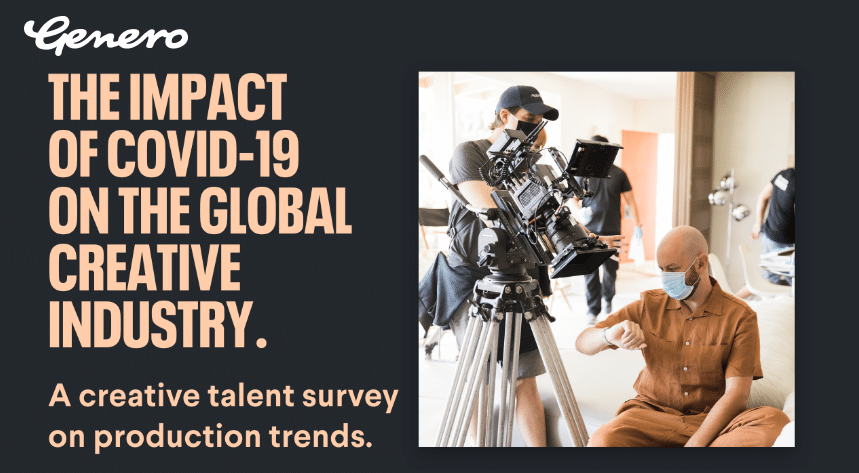
The survey from global creative platform Genero shares first-hand findings from creative talent around the world about the impact COVID-19 has had on their work life, and what the future holds for the creative production industry.
The report, The Impact of COVID-19 on the Global Creative Industry, finds that COVID-19 has accelerated an industry shift towards freelancing and independent work and highlighted some key challenges for creative production.
Genero surveyed 430 creatives – including creative directors, producers, directors, production companies, agencies, animators and more – from 61 different countries in late 2020, to better understand the immediate and long-term impact of the pandemic on the creative industry.
The survey revealed a number of global trends, most notably the immediate and devastating impact of loss of work and income, with 81% of respondents stating that their income had been reduced in the period March 2020 to September 2020, with 40% seeing reductions of over 50%.
This impact on income led many creatives to seek alternative employment, with 72% of respondents having to change their ways of working as a result of the pandemic, either temporarily or permanently.
With restrictions on full scale productions, many creatives adapted to delivering services such as animation and post-production from home, and many also moved into freelance work from full time employment. The shift to freelance is likely to be significant and permanent for the creative industry, with only 12% of respondents stating they would choose full time as their preferred way of working moving forward.
The overwhelming majority would like to freelance (47%) or work as a partner in an independent creative business (35%), accelerating a shift to independent, flexible work.
Mick Entwisle, CEO & Co-founder of Genero said “These insights are critical for brands and agencies to understand, as the resulting fragmentation will change the way that they engage creative talent in future. A flexible, global talent pool offers opportunities for greater efficiency, scale and creativity; but to take advantage, new structures and approaches will be required.” He continued, “For creative talent, it’s undoubtedly been an incredibly difficult time, but we hope we can play a role in empowering creatives looking to make a permanent shift to more flexible, independent work by providing access to ongoing work and exciting opportunities for growth.”
Henric Larsson, founder of full-service content company Chimney Group commented on the findings: “It will be interesting to see how the shift to flexible and independent work impacts in-house strategies. During 2020 we still saw amazing work delivered while working remotely. Adapting to use a distributed creative model will enable brands to tap into a global talent pool, using diverse creatives to make sure their brand is locally relevant in any market around the globe.”
The study also highlights some key challenges that creatives are facing when it comes to production, with increases to both the cost and time required. This is driven primarily by new safety measures such as testing, PPE, sanitization, health & safety officers and increased insurance fees – as well as restrictions around movement.
Where local regulations permit it, additional Genero research shows that production is moving forward at encouraging speeds, but the survey indicates that there will be changes to the way production takes place for a long time to come – including significant safety measures, an ongoing need for flexibility and adaptability, and a shared understanding of the day-to-day considerations this new normal brings.
